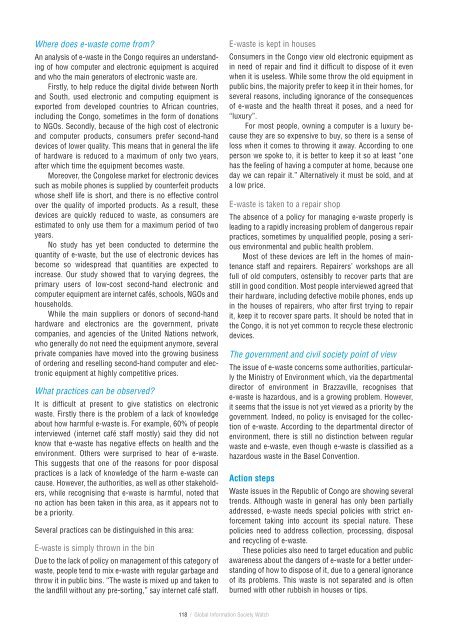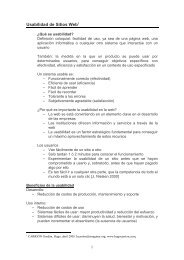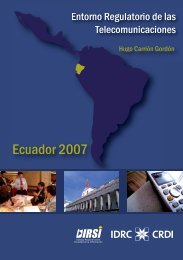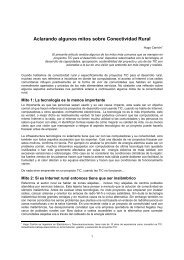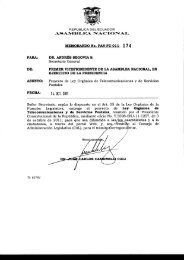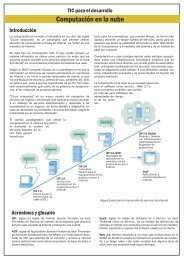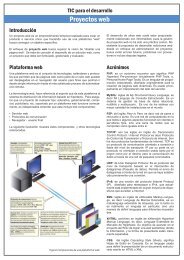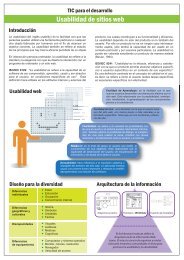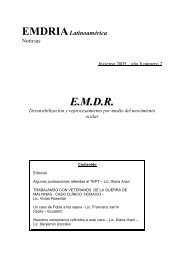GLOBAL INFORMATION SOCIETY WATCH 2010
GLOBAL INFORMATION SOCIETY WATCH 2010
GLOBAL INFORMATION SOCIETY WATCH 2010
You also want an ePaper? Increase the reach of your titles
YUMPU automatically turns print PDFs into web optimized ePapers that Google loves.
Where does e-waste come from?<br />
An analysis of e-waste in the Congo requires an understanding<br />
of how computer and electronic equipment is acquired<br />
and who the main generators of electronic waste are.<br />
Firstly, to help reduce the digital divide between North<br />
and South, used electronic and computing equipment is<br />
exported from developed countries to African countries,<br />
including the Congo, sometimes in the form of donations<br />
to NGOs. Secondly, because of the high cost of electronic<br />
and computer products, consumers prefer second-hand<br />
devices of lower quality. This means that in general the life<br />
of hardware is reduced to a maximum of only two years,<br />
after which time the equipment becomes waste.<br />
Moreover, the Congolese market for electronic devices<br />
such as mobile phones is supplied by counterfeit products<br />
whose shelf life is short, and there is no effective control<br />
over the quality of imported products. As a result, these<br />
devices are quickly reduced to waste, as consumers are<br />
estimated to only use them for a maximum period of two<br />
years.<br />
No study has yet been conducted to determine the<br />
quantity of e‐waste, but the use of electronic devices has<br />
become so widespread that quantities are expected to<br />
increase. Our study showed that to varying degrees, the<br />
primary users of low-cost second-hand electronic and<br />
computer equipment are internet cafés, schools, NGOs and<br />
households.<br />
While the main suppliers or donors of second-hand<br />
hardware and electronics are the government, private<br />
companies, and agencies of the United Nations network,<br />
who generally do not need the equipment anymore, several<br />
private companies have moved into the growing business<br />
of ordering and reselling second-hand computer and electronic<br />
equipment at highly competitive prices.<br />
What practices can be observed?<br />
It is difficult at present to give statistics on electronic<br />
waste. Firstly there is the problem of a lack of knowledge<br />
about how harmful e‐waste is. For example, 60% of people<br />
interviewed (internet café staff mostly) said they did not<br />
know that e‐waste has negative effects on health and the<br />
environment. Others were surprised to hear of e‐waste.<br />
This suggests that one of the reasons for poor disposal<br />
practices is a lack of knowledge of the harm e‐waste can<br />
cause. However, the authorities, as well as other stakeholders,<br />
while recognising that e‐waste is harmful, noted that<br />
no action has been taken in this area, as it appears not to<br />
be a priority.<br />
Several practices can be distinguished in this area:<br />
E‐waste is simply thrown in the bin<br />
Due to the lack of policy on management of this category of<br />
waste, people tend to mix e‐waste with regular garbage and<br />
throw it in public bins. “The waste is mixed up and taken to<br />
the landfill without any pre-sorting,” say internet café staff.<br />
E‐waste is kept in houses<br />
Consumers in the Congo view old electronic equipment as<br />
in need of repair and find it difficult to dispose of it even<br />
when it is useless. While some throw the old equipment in<br />
public bins, the majority prefer to keep it in their homes, for<br />
several reasons, including ignorance of the consequences<br />
of e‐waste and the health threat it poses, and a need for<br />
“luxury”.<br />
For most people, owning a computer is a luxury because<br />
they are so expensive to buy, so there is a sense of<br />
loss when it comes to throwing it away. According to one<br />
person we spoke to, it is better to keep it so at least “one<br />
has the feeling of having a computer at home, because one<br />
day we can repair it.” Alternatively it must be sold, and at<br />
a low price.<br />
E‐waste is taken to a repair shop<br />
The absence of a policy for managing e‐waste properly is<br />
leading to a rapidly increasing problem of dangerous repair<br />
practices, sometimes by unqualified people, posing a serious<br />
environmental and public health problem.<br />
Most of these devices are left in the homes of maintenance<br />
staff and repairers. Repairers’ workshops are all<br />
full of old computers, ostensibly to recover parts that are<br />
still in good condition. Most people interviewed agreed that<br />
their hardware, including defective mobile phones, ends up<br />
in the houses of repairers, who after first trying to repair<br />
it, keep it to recover spare parts. It should be noted that in<br />
the Congo, it is not yet common to recycle these electronic<br />
devices.<br />
The government and civil society point of view<br />
The issue of e-waste concerns some authorities, particularly<br />
the Ministry of Environment which, via the departmental<br />
director of environment in Brazzaville, recognises that<br />
e‐waste is hazardous, and is a growing problem. However,<br />
it seems that the issue is not yet viewed as a priority by the<br />
government. Indeed, no policy is envisaged for the collection<br />
of e‐waste. According to the departmental director of<br />
environment, there is still no distinction between regular<br />
waste and e‐waste, even though e‐waste is classified as a<br />
hazardous waste in the Basel Convention.<br />
Action steps<br />
Waste issues in the Republic of Congo are showing several<br />
trends. Although waste in general has only been partially<br />
addressed, e‐waste needs special policies with strict enforcement<br />
taking into account its special nature. These<br />
policies need to address collection, processing, disposal<br />
and recycling of e‐waste.<br />
These policies also need to target education and public<br />
awareness about the dangers of e‐waste for a better understanding<br />
of how to dispose of it, due to a general ignorance<br />
of its problems. This waste is not separated and is often<br />
burned with other rubbish in houses or tips.<br />
118 / Global Information Society Watch


